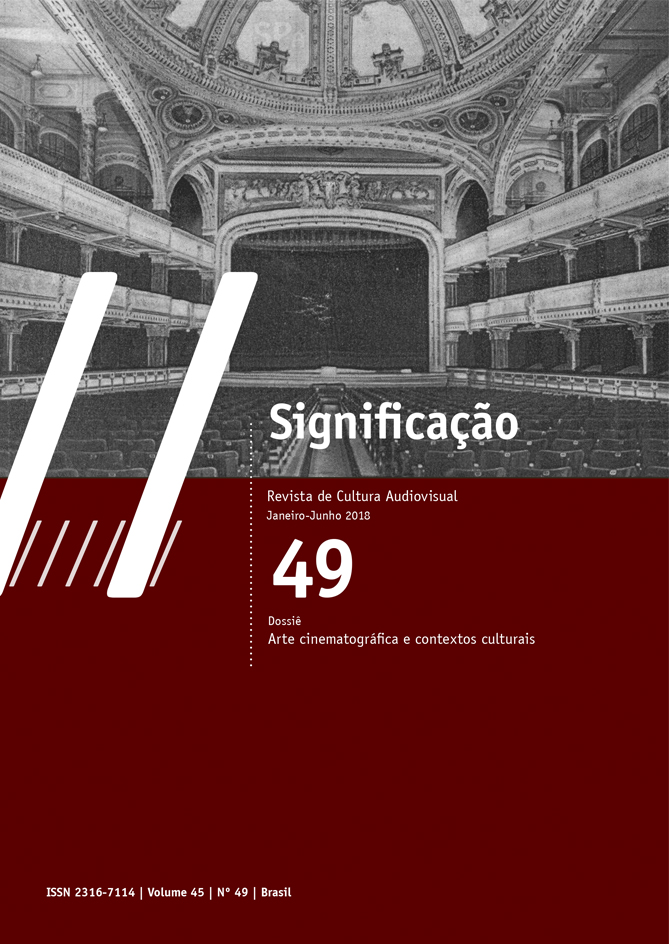Cinema, music and politics in The threepenny opera and Kuhle wampee
DOI:
https://doi.org/10.11606/issn.2316-7114.sig.2018.138123Keywords:
Kurt Weill, Hanns Eisler, Bertolt BrechtAbstract
This article develops a contextual analysis of the films Die dreigroschenoper (The threepenny opera, 1931) and Kuhle wampe (1932). We seek to show the different characterizations of the films political critique, through the relation between sound and image. Hence, the participation of the composers K. Weill and H. Eisler in the films is decisive. After observing the partnership between Brecht and Weill, we spotlight the trajectory of Eisler and his partnership with Brecht, through the conceptual prism of W. Benjamin, evaluating the music role in those films, to show the aesthetic and political correlation between image and sound, from the links between cinema, theater and avant-garde music.
Downloads
References
ADORNO, T. Filosofia da nova música. São Paulo: Perspectiva, 1989.
ARAÚJO, C. “O autor como produtor: reflexos da técnica platônica em Walter Benjamin”. In: OLIVEIRA, L. S.; D’ANGELO, M. Walter Benjamin: arte e experiência. Rio de Janeiro: Nau; Niterói: Eduff, 2009.
BASTOS, M. D. Repertórios em luta: Hanns Eisler, os corais de trabalhadores e o agitprop em fins da República de Weimar. Baleia na rede: estudos em arte e sociedade. Marília, v. 1, n. 10, p. 4-18, 2013. Disponível em: https://goo.gl/CgybtD. Acesso em: 19 mar. 2018.
BENJAMIN, W. “O autor como produtor”. In: Ensaios sobre Brecht. São Paulo: Boitempo, 2017.
BETZ, A. “Brecht e a música”. In: BADER, W. (Org.). Brecht no Brasil: experiências e influências. Rio de Janeiro: Paz e Terra, 1987. p. 65-76.
______. Hanns Eisler political musician. Cambridge: Cambridge University Press, 2006.
BODEK, R. Proletarian performance in Weimar Berlin: agitprop, chorus, and Brecht. Columbia: Camden House, 1997.
BRECHT, B. O processo do filme “A ópera dos três vinténs”: uma experiência sociológica. Porto: Campo das Letras, 2010.
BROWN, H. M. Leitmotiv and drama: Wagner, Brecht, and the limits of “epic” theatre. Oxford: Oxford University Press, 1991.
CALICO, J. H. Brecht at the opera. Berkeley: University of California Press, 2008.
COSTA, I. C. Sinta o drama. Petrópolis: Vozes, 1998.
______. “Brecht no cativeiro das forças produtivas”. In: COSTA, I. C. Nem uma lágrima: teatro épico em perspectiva dialética. São Paulo: Expressão Popular, 2012. p. 137-152.
DAHLHAUS, C. The idea of absolute music. Chicago: University of Chicago Press, 1989.
______. Studies on the origin of harmonic tonality. Princeton: Princeton University Press, 1990.
DAHLHAUS, C.; DEATHRIDGE, J. Wagner. Porto Alegre: L&PM, 1988.
DIE DREIGROSCHENOPER (A ópera dos três vinténs). Direção: Georg Wilhelm Pabst. Música: Kurt Weill. São Paulo: Versátil Home Vídeo, 2010. 3 DVDs (Brecht no Cinema, 453 min). p&b., color.
EISLER, H.; ADORNO, T. Komposition für den film. Frankfurt: Suhrkamp Verlag, 1976.
ESTEVAM, D.; COSTA, I. C.; BÔAS, R. V. (Org.). Agitprop: cultura política. São Paulo: Expressão Popular, 2016.
GILLIAM, B. “Stage and screen: Kurt Weill and operatic reform in the 1920s”. In: GILLIAM, B. (Ed.). Music and performance during the Weimar Republic. Cambridge: Cambridge University Press, 2005. p. 1-12 (Notas p. 154-159).
HINTON, S. (Ed.). Kurt Weill: the threepenny opera. Cambridge: Cambridge University Press, 2008.
KOWALKE, K. H. “Singing Brecht versus Brecht singing: performance in theory and practice”. In: GILLIAM, B. (Ed.). Music and performance during the Weimar Republic. Cambridge: Cambridge University Press, 2005. p. 74-93 (Notas p. 186-195).
KUHLE wampe oder: wem gehört die welt? Direção: Slatan Dudow. Roteiro: Bertolt Brecht e Enst Ottwalt. Trilha sonora: Hanns Eisler. São Paulo: Versátil Home Vídeo, 2010. 3 DVDs (Brecht no Cinema, 453 min). p&b., color.
LEIBOWITZ, R. Schoenberg. São Paulo: Perspectiva, 1981.
SCHRADER, B.; SCHEBERA, J. The “golden” twenties: art and literature in the Weimar Republic. New Haven: Yale University Press, 1990.
SZONDI, P. Teoria do drama moderno: 1880-1950. São Paulo: Cosac & Naify, 2001.
WEILL, K. Musik und theater: gesalmmete schriften. Editado por Stephen Hinton e Jürgen Schebera. Berlin: Henschelverlag, 1990.
Downloads
Published
Issue
Section
License
Copyright (c) 2018 Manoel Dourado Bastos

This work is licensed under a Creative Commons Attribution-NonCommercial 4.0 International License.
Authors who publish in this journal must agree with the following terms:
- Authors keep their copyrights and grant the journal first time publication rights, having their articles simultaneously licensed under the Creative Commons Attribution License, which allows sharing texts with authorship recognition and first publication on this journal for non-commercial purposes.
- Authors are allowed to make additional contracts, for a non-exclusive distribution of the article’s version published on this journal (e.g.: publishing in institutional repositories of articles or as a book chapter), with authorship recognition and first publication on this journal.
















